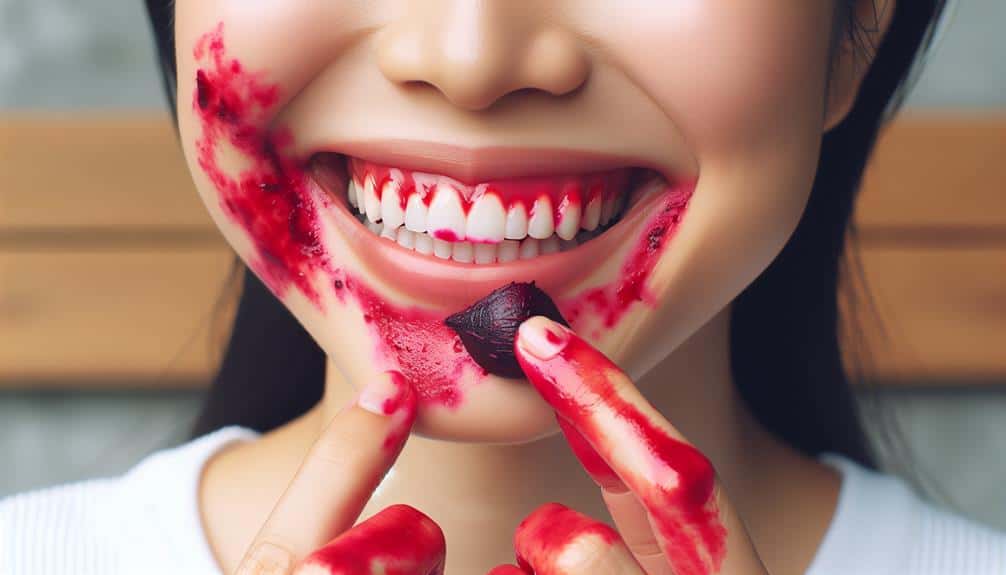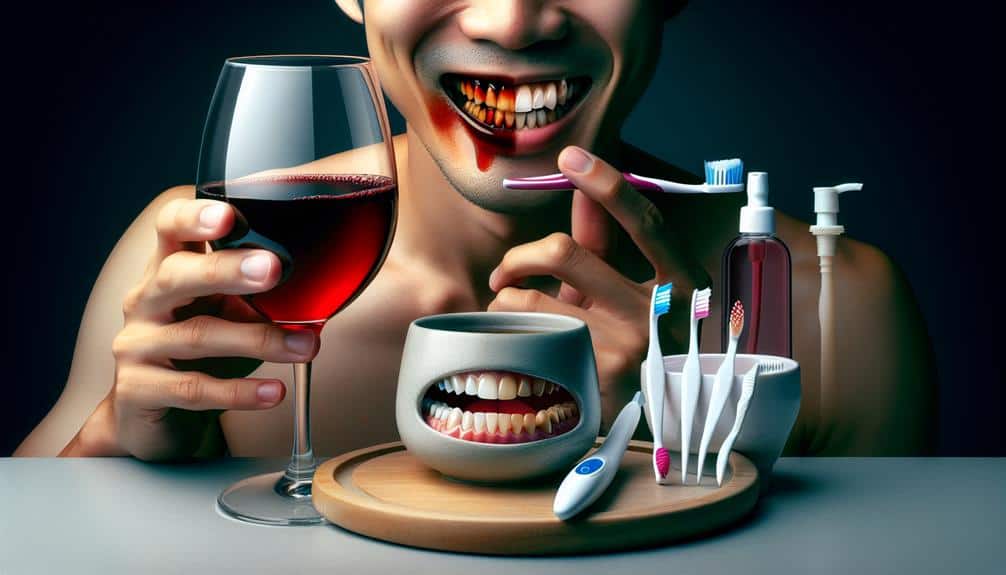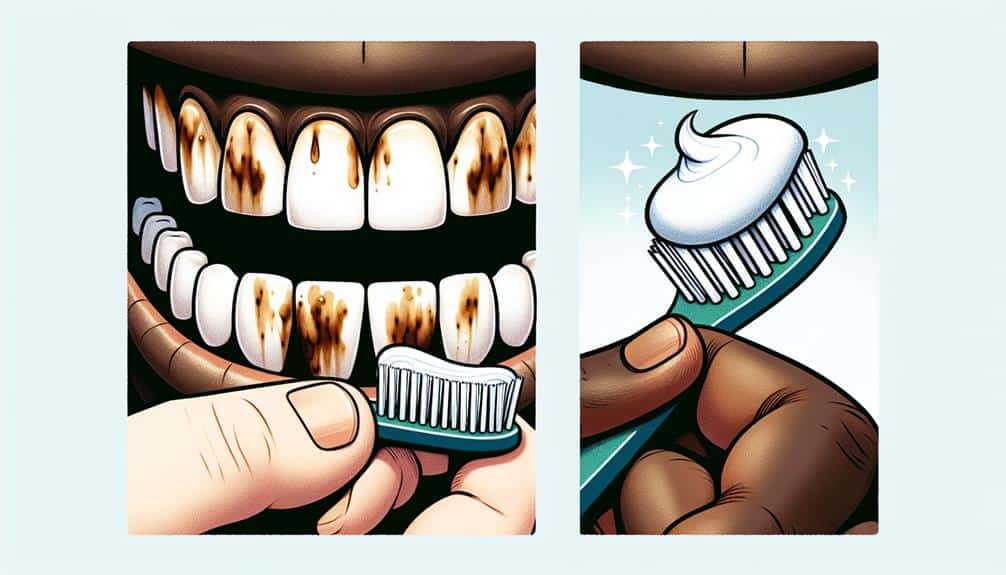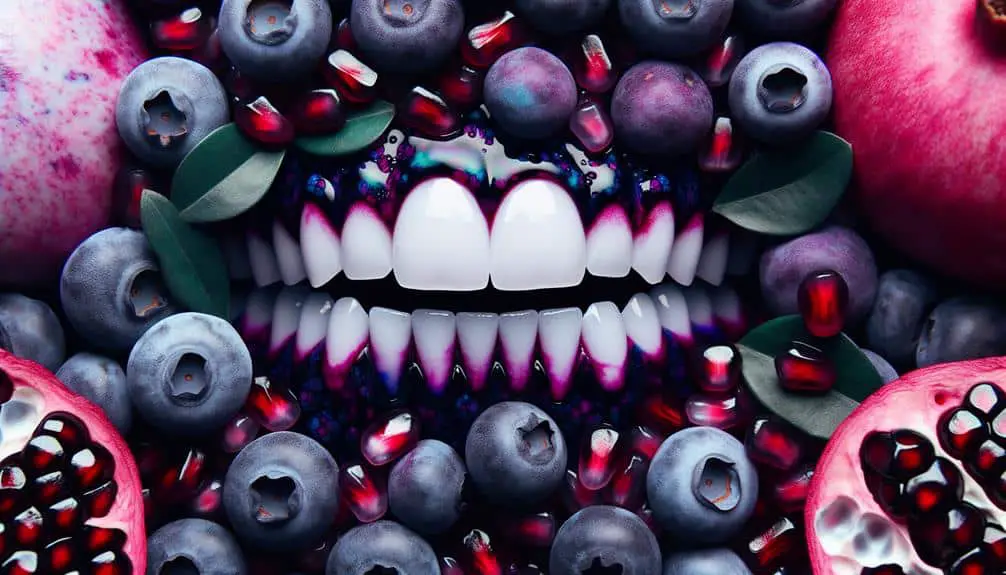When beets and tomato sauce come into contact with your teeth, their pigmented compounds bind to the enamel surface, causing discoloration. The acidity of these foods can weaken enamel, making it more susceptible to staining. Moderation in consumption and maintaining good oral hygiene are key to reducing the staining effects. Understanding how these substances interact with your teeth can help you make informed choices about your oral health.
Key Points
- Beets contain strong pigments that adhere to teeth, causing gradual discoloration.
- Tomato sauce's acidity and pigmented compounds weaken enamel, leading to staining.
- Pigmented compounds in beets and tomato sauce penetrate porous enamel, causing discoloration.
- Enamel protection is crucial to prevent staining from beets and tomato sauce.
- Moderation in consuming beets and tomato sauce helps reduce their impact on tooth color.
The Science Behind Teeth Staining
Understanding the chemical processes that lead to teeth staining can shed light on why beets and tomato sauce have such a noticeable effect on tooth discoloration. Dental enamel, the outer layer of the tooth, plays a pivotal role in protecting the underlying structures. However, enamel isn't impervious to pigmented compounds found in various foods and beverages. When these compounds come into contact with the enamel, they can bind to its surface, causing staining.
Pigmented compounds in foods like beets and tomato sauce contain molecules that are able to penetrate the porous enamel. These molecules can then become embedded within the enamel's structure, leading to visible discoloration. The staining process is further exacerbated by the acidity of certain foods, which can weaken the enamel and make it more susceptible to pigmentation.
To prevent or reduce teeth staining, it's essential to maintain good oral hygiene practices, such as regular brushing and flossing. Additionally, limiting the consumption of highly pigmented foods and beverages can help preserve the natural whiteness of dental enamel.
How Beets Impact Tooth Color
Beets can significantly influence the color of your teeth due to their high concentration of pigmented compounds that can permeate and stain dental enamel. The deep red tint of beet juice contains potent pigments that can adhere to the porous surface of your enamel, resulting in discoloration over time. To maintain the natural whiteness of your teeth, understanding the impact of consuming beets on your oral health is vital. Here are some key points to take into account:
- Beet juice contains strong pigments: The vivid hue of beet juice originates from compounds like betalains, which possess a robust staining capacity.
- Regular intake can result in gradual discoloration: With time, the pigmented compounds in beet juice can build up on the surface of your teeth, causing visible stains.
- Enamel protection is essential: To prevent excessive staining, make sure to prioritize enamel protection through proper oral hygiene practices.
- Take into account moderation: While beets offer numerous health benefits, consuming them moderately can help reduce their impact on tooth color.
- Consult your dentist: If you're worried about the effects of beet consumption on your teeth, seeking advice from a dental professional can offer personalized guidance.
Tomato Sauce and Dental Discoloration
Consuming tomato sauce regularly can lead to dental discoloration due to its acidic nature and pigmented compounds that can adhere to tooth enamel. The acidity of tomato sauce can contribute to acid erosion of the enamel, which is the hard outer layer of the tooth. When enamel is exposed to acidic substances like tomato sauce frequently, it can weaken the enamel over time, making it more susceptible to staining and discoloration.
Tomato sauce contains a high level of acidity, which can wear down the enamel protection on your teeth. The pigmented compounds in tomato sauce can also cause staining by binding to the enamel surface. To mitigate the effects of tomato acidity on tooth enamel, it's advisable to consume acidic foods like tomato sauce in moderation and practice good oral hygiene habits such as brushing your teeth after meals. Additionally, drinking water or consuming dairy products alongside acidic foods can help neutralize the acid and reduce its impact on tooth enamel.
Avoiding Teeth Stains From Foods
To prevent teeth stains caused by foods, it's crucial to implement effective oral hygiene practices and make smart dietary choices. Proper care of your teeth can greatly reduce the impact of staining foods.
Here are some strategies to help you avoid teeth stains:
- Brush and Floss Regularly: Maintaining a consistent oral hygiene routine can help prevent stains by removing food particles and plaque.
- Use a Straw: When consuming beverages like coffee or wine, using a straw can help minimize direct contact with your teeth.
- Rinse Your Mouth: After consuming foods or drinks known to cause stains, rinse your mouth with water to help reduce their effects.
- Chew Sugar-Free Gum: Chewing gum stimulates saliva production, which can help wash away staining substances.
- Visit Your Dentist: Regular dental check-ups can catch stains early and provide professional cleaning to keep your teeth looking their best.
Strategies for Whiter Teeth
To achieve whiter teeth, implementing proper oral hygiene practices and making smart dietary choices is crucial. Maintaining good oral hygiene involves brushing your teeth at least twice a day, flossing daily, and using mouthwash to reduce plaque buildup and prevent stains. Choosing the right toothpaste with whitening agents can also help brighten your smile. Additionally, avoiding foods and drinks that are known to stain teeth, such as coffee, tea, and red wine, can contribute to a whiter smile.
Natural remedies like baking soda and hydrogen peroxide can be used to gently whiten teeth at home. Baking soda acts as a mild abrasive that can scrub away surface stains, while hydrogen peroxide has bleaching properties that can lighten teeth. However, using these remedies cautiously is crucial to avoid damaging your enamel.
For more stubborn stains or faster results, professional treatments like teeth whitening performed by a dentist can be considered. These treatments use stronger bleaching agents to whiten teeth more effectively. Consulting with a dental professional can help you determine the best option for achieving a brighter, whiter smile.
Frequently Asked Questions
Can Teeth Staining From Beets and Tomato Sauce Be Prevented by Brushing Immediately After Consumption?
To prevent teeth staining from beets and tomato sauce, brush immediately after consumption. Use proper brushing techniques and timing. Consider dietary alternatives. Maintain good oral hygiene to combat stains effectively and maintain a healthy smile.
Are There Any Natural Remedies or Home Remedies That Can Help Remove Stains From Beets and Tomato Sauce on Teeth?
To tackle teeth stains from beets and tomato sauce, consider natural remedies like baking soda or hydrogen peroxide solutions. DIY solutions, such as oil pulling with coconut oil, can also help combat discoloration caused by these foods and beverages.
Do Certain Types of Beets or Tomato Sauce Cause More Staining Than Others?
Certain types of beets and tomato sauce, due to their high pigmentation content, can cause more staining on teeth. Brushing after consumption and preventive measures like moderation can help reduce the impact of staining.
How Long Does It Typically Take for Teeth Stains From Beets and Tomato Sauce to Fade Away on Their Own?
To effectively remove stains from beets and tomato sauce on teeth, the fading process typically takes a few days to a week. Proper oral hygiene, like brushing and flossing, aids in speeding up the natural discoloration reversal.
Are There Any Specific Dental Products or Treatments That Are Effective in Removing Stains Caused by Beets and Tomato Sauce?
For removing stains caused by beets and tomato sauce, dental whitening products and treatments are effective. Dentists may recommend professional whitening procedures or at-home kits with bleaching agents to target stubborn stains and restore your teeth's natural brightness.



